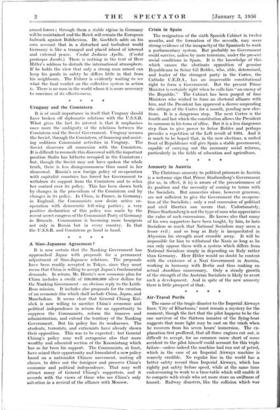Crisis in Spain The resignation of the sixth Spanish Cabinet
in twelve months, and the formation of the seventh, may seem strong evidence of the incapacity of the Spaniards to work a parliamentary system. But probably no Government could survive, unless by mere terrorism, under the present social conditions in Spain. It is the knowledge of this which causes the obstinate opposition of genuine Republicans to Senor Gil Robles, who, able, determined, and leader of the strongest party in the Cortes, the Catholic C.E.D.A., has an impeccable constitutional right to form a Government. But the present Prime Minister is certainly right when he calls him "an enemy of the Republic." The Cabinet has been purged of four Ministers who wished to form an electoral alliance with him, and the President has approved a decree suspending the sittings of the Cortes for a month, pending new elec- tions. It is a dangerous step. The next Cortes is the fourth and last which the constitution allows the President to summon in his term of office. But it is a less dangerous step than to give power to Senor Robles and perhaps provoke a repetition of the Left revolt of 1934. And it is much to be hoped that, in the new elections, a united front of Republicans will give Spain a stable government, capable of carrying out the necessary social reforms, particularly in the fields of education and agriculture.










































 Previous page
Previous page